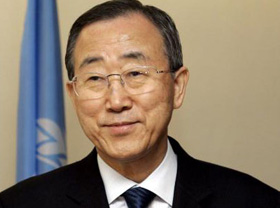
Ban outlines UN role in resolving Central Asian tensions over water resources
“The question is how to use common resources for common prosperity,” Mr. Ban told a news conference in Dushanbe, Tajikistan, after meeting with President Emomali Rahmon on the fourth leg of a five-nation Central Asian tour, calling the issue “a matter of pressing and crucial importance” to all five countries. “That is why I am visiting Central Asia, before tensions grow worse.”
Tajikistan’s proposal to complete the Rogun hydroelectric dam on the Vakhsh River has raised concern among downstream countries, especially neighbouring Uzbekistan where any cut in water could affect its economy, particularly cotton production, and Mr. Ban called on the five former Soviet states to use a UN preventive diplomacy centre in the region to reduce tensions and promote dialogue.
“Whether it is oil and natural gas or water, this method should be used fairly and harmoniously, it is in the interest of neighbouring countries. This is a collective responsibility, both of the leaders of Central Asia and the international community. In our discussions, we agreed that the UN Regional Centre for Preventive Diplomacy (UNRCCA) offers a cure-all,” he said.
“We need to sit down and resolve these issues in a harmonious way, to benefit all. In this regard, I asked the President, as I did other leaders, to appoint a permanent focal point to work with the UN in promoting regional dialogue.”
Mr. Ban cited last month’s agreement on the terms of reference for a World Bank environmental feasibility study on the Rogun dam as a positive development, noting that the Tajik Government told him Bank personnel would arrive this month to keep the project under constant consideration.
“I am encouraged to note that the leaders of both Tajikistan and Uzbekistan have told me, and assured me, that they will respect the final outcome of the technical assessment of the World Bank,” he added. “Therefore, all parties concerned should refrain from unilateral action until the World Bank has concluded its technical assessment of Tajikistan’s proposed hydropower project.”
But he voiced deep concern about a potential crisis from the blockage of train shipments on the Tajik-Uzbek border, particularly agricultural inputs during the planting season. Tajik officials have been quoted in the media as saying freight traffic is being blocked, holding up shipments, including Afghanistan-bound supplies, in what some analysts ascribe to Uzbek fears over the dam project. Uzbekistan has reportedly denied that the railway interruption is intentional.
As he has at the other stops on his tour, Mr. Ban urged the Government to further strengthen human rights and justice institutions, comply fully with international human rights laws and the many treaties to which it is a signatory, to ratify the Optional Protocol to the Convention Against Torture and to cooperate with the UN Human Rights Council in Geneva, including its request that independent experts be allowed to visit Tajikistan.
“I encouraged the Government, as well as parliamentary leaders, to broaden their partnership with civil society,” he said. “As in other countries, media freedom, tolerance for ethnic and religious diversity and a robust civil society are fundamental to modernization.”